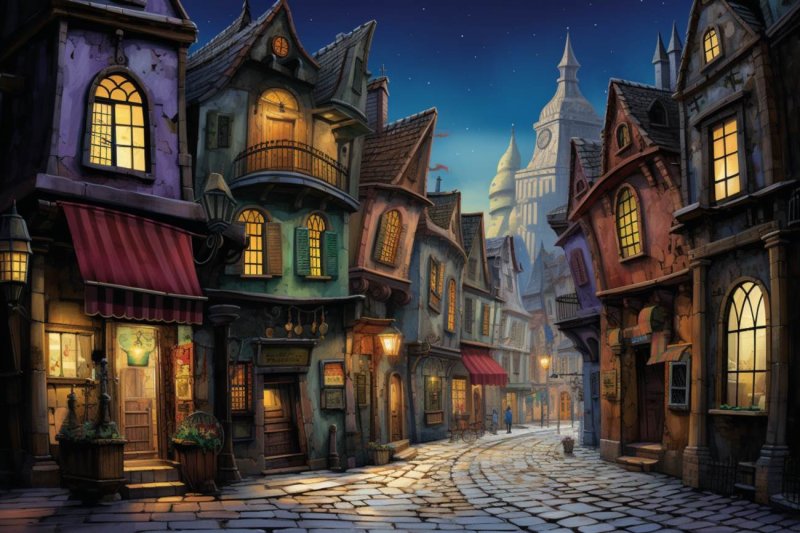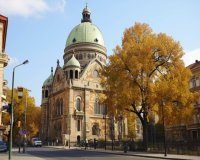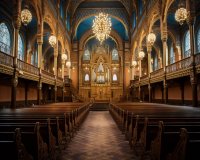Exploring Budapest’s Jewish Quarter: A Historical Journey

Exploring Budapest's Jewish Quarter: A Historical Journey
Budapest, the capital of Hungary, is a city steeped in history and culture. Among its many neighborhoods, the Jewish Quarter stands out as a vibrant and historically significant area. In this article, we will take you on a journey through Budapest's Jewish Quarter, delving into its rich history, culture, and the must-see attractions that make it a captivating destination.
The Historical Background
The Jewish Quarter, located in the heart of Budapest's District VII, has a complex history that spans centuries. Jews have lived in Hungary for over a thousand years, and their presence in Budapest can be traced back to the medieval period. However, the neighborhood as we know it today took shape in the 19th century when Budapest's Jewish community began to flourish.
During this time, the area became a hub of Jewish life, with synagogues, schools, and cultural institutions flourishing. It was also during this period that the iconic Dohány Street Synagogue, one of the largest in the world, was built. Its stunning architecture and rich symbolism make it a must-visit landmark.
World War II and the Holocaust
The 20th century brought both prosperity and tragedy to the Jewish Quarter. World War II and the Holocaust had a devastating impact on Hungary's Jewish community. The neighborhood's history is marked by the memory of those who suffered and perished during this dark period.
Today, you can visit the Holocaust Memorial Center, located in the heart of the Jewish Quarter, to pay your respects and learn about the history of the Holocaust in Hungary. It's a somber but essential stop on any tour of the area.
Post-War Resilience and Rebirth
After the war, the Jewish community in Budapest faced significant challenges, but they were determined to rebuild. The Jewish Quarter saw a resurgence of Jewish life, with the reopening of synagogues, the revival of Jewish cultural institutions, and the emergence of a lively arts and nightlife scene.
One of the most notable symbols of this post-war revival is the ruin bars. These unique and eclectic bars, often located in abandoned buildings, have become synonymous with the Jewish Quarter's vibrant spirit. Szimpla Kert, one of the first ruin bars, is a must-visit for its quirky atmosphere and cultural events.
Exploring the Jewish Quarter Today
Today, Budapest's Jewish Quarter is a fascinating blend of history, culture, and contemporary life. As you wander its streets, you'll encounter a mix of traditional Jewish shops, restaurants serving delicious kosher cuisine, and street art that reflects the area's creative energy.
Be sure to explore Kazinczy Street, the heart of the neighborhood, where you'll find a variety of eateries and pubs. Try some traditional Jewish dishes like matzo ball soup or cholent at one of the local restaurants, and don't forget to sample the famous Hungarian pastries, such as flódni and rugelach.
For those interested in history and culture, a visit to the Jewish Museum is a must. Here, you can learn more about the history of Hungarian Jewry through a collection of artifacts, documents, and artworks.
Conclusion
Budapest's Jewish Quarter is a testament to the resilience of a community that has faced adversity throughout its history. It's a place where the past is honored, and the present is vibrant and full of life. Exploring this neighborhood is not only a journey through time but also an opportunity to celebrate the enduring spirit of Budapest's Jewish community.
So, whether you're interested in history, culture, or simply soaking in the unique atmosphere of this dynamic neighborhood, a visit to Budapest's Jewish Quarter is a must for any traveler.
Budapest Grand Half-Day Jewish Heritage Tour
Explore the vibrant Jewish heritage of Budapest, home to the largest Jewish community in Eastern Europe. Delve into their rich cultural, historical, and religious legacy, a tapestry woven through centuries of Hungarian and Jewish intertwining.
This guided tour offers a profound insight into Budapest's Jewish legacy, encompassing iconic landmarks and significant sites:
- Dohány Street Synagogue: Visit Europe's largest synagogue, a testament to architectural grandeur and historical significance.
- Jewish Museum: Embark on a guided exploration of the museum, delving deep into local history and artifacts.
- Raoul Wallenberg Memorial Park: Pay tribute to the heroes of the past amidst the serene ambiance of this Holocaust Memorial Park, featuring the poignant Tree of Life.
- Jewish Quarter: Roam the lively streets of the former Ghetto, where synagogues, monuments, kosher restaurants, and shops echo with tales of resilience.
- Kazinczy Street Synagogue: Enter one of Europe's largest operating orthodox synagogues, an architectural marvel in the heart of the city.
- Carl Lutz Memorial: Visit the Memorial Park dedicated to Carl Lutz, known as "Hungary’s Schindler," honoring his courageous efforts during challenging times.
- Gozsdu Passage: Stroll through this historic passage, an embodiment of Budapest's multicultural charm.
Conclude your tour with a choice: savor a delightful cake in the glatt kosher Fröhlich confectionery or enjoy a 10% discount at the glatt kosher Carmel restaurant, adding a sweet note to your exploration.
Includes:
- Professional guide throughout the entire tour
- Entrance fees to key sites: Jewish Museum, Dohány Street Synagogue, Raoul Wallenberg Memorial Park, Kazinczy Street Synagogue
- Option for cake in the glatt kosher Fröhlich confectionery or 10% off at the glatt kosher Carmel Restaurant
Important Information:
- Meeting Point: Dohány Street Synagogue, Dohány u. 2, 1074
- Duration: 4 hours
- Language: Live tour guide in English
- Additional: Comfortable shoes and valid ID/Passport
Customer Reviews:
Rated 4.8 out of 5 based on 51 reviews.
One visitor shared, "Daniel and Esther were terrific and very knowledgeable guides. They made our tour very enjoyable. Highly recommended for anyone interested in Jewish religious practices and artifacts and the history of the Jewish population in Budapest and Hungary."
Experience the heart of Budapest's Jewish heritage through this immersive guided tour.
The Early Traces of Jewish Presence in Budapest
Budapest, the capital city of Hungary, is a vibrant and diverse metropolis with a rich cultural and historical heritage. Among the many communities that have left their mark on the city, the Jewish population has played a significant role. The early traces of Jewish presence in Budapest are a testament to their enduring influence on the city's development.
The Arrival of Jews in Budapest
The history of Jews in Budapest can be traced back to the late 18th century when Hungary was part of the Habsburg Empire. The first Jewish settlers arrived in Buda and Pest, the two separate cities that later merged to form Budapest. They came primarily from other parts of the Habsburg Empire, seeking economic opportunities and fleeing persecution in their homelands.
Initially, Jews in Budapest faced various restrictions and were confined to living in specific areas of the city. However, over time, their numbers grew, and their contributions to the city's commerce, culture, and intellectual life became increasingly evident.
Jewish Districts in Budapest
As the Jewish community in Budapest expanded, certain districts became known for their significant Jewish presence. One such area is the historic Jewish Quarter, located in the 7th district of Budapest. This district is home to several iconic landmarks, including the Great Synagogue, which is one of the largest synagogues in the world.
The Great Synagogue, also known as Dohány Street Synagogue, is a stunning architectural marvel and a symbol of Budapest's Jewish heritage. It was built in the mid-19th century and remains a focal point for both religious and cultural events within the Jewish community.
Cultural Contributions
The Jewish community in Budapest has made enduring contributions to the city's cultural life. Jewish authors, musicians, and artists have played pivotal roles in shaping Budapest's artistic landscape. Prominent Jewish figures like Franz Liszt, a renowned composer and pianist, and playwright Ferenc Molnár, have left an indelible mark on Hungarian culture.
Additionally, Jewish cuisine has become an integral part of Budapest's culinary scene. Delicacies like matzo ball soup, gefilte fish, and various pastries are enjoyed by both locals and visitors alike. The influence of Jewish cuisine can be savored in numerous eateries throughout the city.
The Holocaust and its Impact
While Budapest's Jewish community thrived for much of its history, it also endured dark periods, notably during World War II. The Holocaust had a devastating impact on the Jewish population in Budapest, with thousands of Jews perishing in concentration camps. The Shoes on the Danube Bank memorial stands as a poignant reminder of this tragic chapter in history.
Despite the horrors of the Holocaust, Budapest's Jewish community has shown resilience and determination. Today, it continues to thrive, with synagogues, cultural centers, and educational institutions preserving its heritage and fostering a sense of belonging among the younger generations.
Conclusion
The early traces of Jewish presence in Budapest are deeply woven into the fabric of the city's history. From their arrival in the 18th century to their enduring contributions to culture and society, the Jewish community has left an indelible mark on Budapest. Their story serves as a testament to the importance of diversity and the enduring strength of a community that has faced both triumphs and tribulations.
Jewish Budapest: 3-Hour Small Group Tour with Historian
Discover the Jewish heritage of Budapest with a passionate historian guide. Learn about the Jewish district and its turbulent history from the late 1700s. Explore the interior of the Rumbach Street Synagogue.
Experience one of the most popular areas of inner Pest, the 7th district, where Jewish culture has flourished for over two centuries. Today, it hosts the largest and most active Jewish community in Eastern Europe. The tour's highlight includes a visit to the Rumbach Street Synagogue and an exploration of the neighborhood surrounding the Dohány Street Synagogue, one of the largest synagogues globally.
Stroll through the Jewish Quarter, once the Ghetto, now home to synagogues, monuments, kosher restaurants, and shops. Gain insight into local stories and Budapest's history. Pay a visit to the Carl Lutz Memorial, honoring one of the Righteous Among the Nations, often dubbed Hungary's Schindler. Pass by the vibrant Gozsdu Passage and explore the Rumbach Street Synagogue, an architectural gem constructed in 1872 by Viennese architect Otto Wagner.
Beyond Europe's largest synagogue and the two other significant ones, receive local tips on ruin pubs and nightlife. Learn about the street art and uncover secrets of Elizabeth Town.
Highlights:
- Explore centuries of Hungary's Jewish history
- Visit the historical Rumbach Street Synagogue
- Admire Budapest's street art
- View the exterior of the Dohány Street Synagogue
- Learn about the heroes who saved Jewish lives during WWII
Join us on this insightful journey into Budapest's rich Jewish heritage.
Meeting Point
Meet your guide in front of Kempinski Hotel Corvinus Budapest, facing the Ferris wheel on Erzsébet Square. The hotel is accessible via the M1, M2, or M3 subways and various buses and trams. Disembark at the Deák Ferenc tér stop for easy access to the meeting point.
Covid-19 Precautions:
Special health and safety measures are in place. Refer to your activity voucher for full details.
Note: This tour is wheelchair accessible and limited to 10 participants.
The Evolution of Culture and Heritage: Budapest
Budapest, the capital city of Hungary, is a place steeped in rich cultural heritage that has evolved over centuries. This city, often referred to as the "Paris of the East," is a melting pot of various influences, reflecting its complex history and diverse population.
Historical Significance: Budapest's cultural evolution can be traced back to ancient times when it was known as Aquincum, a Roman town. Over the centuries, it witnessed the rise and fall of empires, including the Austro-Hungarian Empire, Ottoman Empire, and Soviet influence during the Cold War era.
Architectural Marvels: One of the most striking features of Budapest is its architectural diversity. From the neo-Gothic spires of the Parliament Building to the Turkish baths dating back to the Ottoman era, every corner of the city tells a story of its past.
Art and Music: Budapest has long been a hub for artists and musicians. The city gave birth to renowned composers like Franz Liszt and Béla Bartók, whose influence can still be felt in the vibrant music scene today. The Hungarian National Museum and the Museum of Fine Arts are testament to the city's commitment to preserving its artistic heritage.
Cuisine: The culinary scene in Budapest is a fusion of traditional Hungarian flavors with influences from surrounding cultures. Dishes like goulash, paprika chicken, and chimney cake are staples, reflecting a blend of Ottoman, Austrian, and Jewish culinary traditions.
Festivals and Celebrations: Budapest is a city that knows how to celebrate. Whether it's the lively Budapest International Documentary Festival or the spectacular Budapest Wine Festival, the city provides a platform for showcasing both local and international talent.
Language and Literature: The Hungarian language itself is a testament to the city's unique cultural identity. It is part of the Finno-Ugric language family, making it distinct from its European neighbors. Budapest has also been home to numerous literary giants, including Imre Kertész, who won the Nobel Prize in Literature in 2002.
Preservation Efforts: Recognizing the importance of its cultural heritage, Budapest has undertaken extensive preservation efforts. The Buda Castle, a UNESCO World Heritage site, stands as a prime example of the city's dedication to safeguarding its historical treasures.
Modern Influences: While Budapest cherishes its heritage, it is also a city in motion, embracing modernity with open arms. The emergence of contemporary art galleries, innovative startups, and a thriving nightlife scene adds a dynamic layer to the city's cultural landscape.
Conclusion: Budapest's evolution of culture and heritage is a testament to its resilience and adaptability. It stands as a living museum, where the past and present coexist harmoniously, offering visitors a unique and enriching experience.






